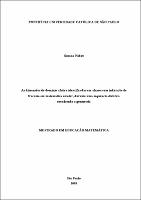Use este identificador para citar ou linkar para este item:
https://repositorio.pucsp.br/jspui/handle/handle/21709Registro completo de metadados
| Campo DC | Valor | Idioma |
|---|---|---|
| dc.creator | Nobre, Suzana | - |
| dc.creator.Lattes | http://buscatextual.cnpq.br/buscatextual/visualizacv.do?id=K8088766J8 | por |
| dc.contributor.advisor1 | Manrique, Ana Lúcia | - |
| dc.date.accessioned | 2018-12-11T11:59:03Z | - |
| dc.date.issued | 2018-09-17 | - |
| dc.identifier.citation | Nobre, Suzana. As dimensões do domínio afetivo identificadas em alunos com indicação de fracasso em matemática escolar, durante uma sequência didática envolvendo a geometria. 2018. 137 f. Dissertação (Mestrado em Educação Matemática) - Programa de Estudos Pós-Graduados em Educação Matemática, Pontifícia Universidade Católica de São Paulo, São Paulo, 2018. | por |
| dc.identifier.uri | https://tede2.pucsp.br/handle/handle/21709 | - |
| dc.description.resumo | Esta pesquisa tem o objetivo de identificar dimensões do domínio afetivo que emergem das interações entre alunos durante uma sequência didática envolvendo a geometria. O estudo considerou como descritores do domínio afetivo as crenças, as emoções e as atitudes, com suas subcategorias. As hipóteses formuladas pressupõem que cognição e afeto não podem ser investigados separadamente, assim como o afeto também não pode ser investigado separadamente do contexto no qual o aluno está inserido. Os sujeitos da pesquisa foram os alunos do 5º ano do Ensino Fundamental de uma escola pública do município de São Paulo. O foco das observações recaiu particularmente nos alunos indicados para a recuperação paralela de Matemática. A coleta dos dados foi feita com as videogravações dos grupos e da sala de aula durante a aplicação da sequência didática, que foi elaborada com base na Teoria das Situações Didáticas e levou em conta as condições cognitivas de aprendizagem da geometria. Foi feita a análise qualitativa dos episódios emocionais – extratos de acontecimentos na sala de aula registrados em fragmentos de videogravação. A análise dos dados permitiu identificar a emergência de crenças, atitudes e emoções, intrinsecamente relacionadas à aprendizagem durante as atividades em grupo da sequência didática. Foi possível também identificar as componentes cognitiva, afetiva e intencional das atitudes que influenciam o comportamento. Além disso, evidenciou a interdependência das dimensões do domínio afetivo, isto é, a influência que uma dimensão exerce no aparecimento ou emergência de outra. Dessa forma, as hipóteses foram verificadas, indicando que é possível e necessário romper definitivamente com a dicotomia cognição e afeto | por |
| dc.description.abstract | This research aims to identify dimensions of the affective domain that emerge from the interactions among students during a didactic sequence involving geometry. The study considered as descriptors of the affective domain the beliefs, the emotions and the attitudes, with its subcategories. The hypotheses formulated presuppose that cognition and affection cannot be investigated separately as affection cannot be investigated separately from the context in which the student is inserted. The subjects of the research were the students of the 5th year of Elementary School in a public school in the city of São Paulo. The focus of the observations fell particularly on the students indicated for the parallel recovery of Mathematics. The data collection was done with the video recordings of the groups and the classroom during the application of the didactic sequence, which was elaborated based on the Theory of Didactic Situations and took into account the cognitive conditions of learning of the geometry. The qualitative analysis of the emotional episodes – extracts of events in the classroom recorded in fragments of video recording was made. The analysis of the data allowed to identify the emergence of beliefs, attitudes and emotions, intrinsically related to learning during the group activities of the didactic sequence. It was also possible to identify the cognitive, affective and intentional components of attitudes that influence behavior. In addition, it showed the interdependence of the dimensions of the affective domain, that is, the influence that one dimension exerts on the emergence of another dimension. Thus, the hypotheses were verified, indicating that it is possible and necessary to definitively break with the dichotomy cognition and affection | eng |
| dc.description.sponsorship | Coordenação de Aperfeiçoamento de Pessoal de Nível Superior - CAPES | por |
| dc.format | application/pdf | * |
| dc.thumbnail.url | http://tede2.pucsp.br/tede/retrieve/47615/Suzana%20Nobre.pdf.jpg | * |
| dc.language | por | por |
| dc.publisher | Pontifícia Universidade Católica de São Paulo | por |
| dc.publisher.department | Faculdade de Ciências Exatas e Tecnologia | por |
| dc.publisher.country | Brasil | por |
| dc.publisher.initials | PUC-SP | por |
| dc.publisher.program | Programa de Estudos Pós-Graduados em Educação Matemática | por |
| dc.rights | Acesso Aberto | por |
| dc.subject | Geometria - Estudo e ensino | por |
| dc.subject | Matemática - Estudo e ensino | por |
| dc.subject | Emoções e cognição | por |
| dc.subject | Sequência didática | por |
| dc.subject | Geometry - Study and teaching | eng |
| dc.subject | Mathematics - Study and teaching | eng |
| dc.subject | Emotions and cognition | eng |
| dc.subject | Didactic sequence | eng |
| dc.subject.cnpq | CNPQ::CIENCIAS EXATAS E DA TERRA::MATEMATICA | por |
| dc.title | As dimensões do domínio afetivo identificadas em alunos com indicação de fracasso em matemática escolar, durante uma sequência didática envolvendo a geometria | por |
| dc.type | Dissertação | por |
| Aparece nas coleções: | Programa de Pós-Graduação em Educação Matemática | |
Arquivos associados a este item:
| Arquivo | Descrição | Tamanho | Formato | |
|---|---|---|---|---|
| Suzana Nobre.pdf | 28,5 MB | Adobe PDF |  Visualizar/Abrir |
Os itens no repositório estão protegidos por copyright, com todos os direitos reservados, salvo quando é indicado o contrário.
